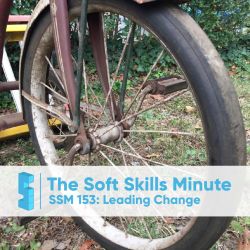Share

Serious Soft Skills
Podcast 5: The First Step to Improve Your Soft Skills
•
Dr. Tobin Porterfield and Bob Graham take a deeper dive into one of the key areas of soft skills: Individual soft skills. We’re also going to talk about how best to get moving toward improving your soft skills.
Bob Graham ‘0:00’: Coming up, we’re going to take a deeper dive into one of the key area of soft skills: Individual soft skills.
Graham ‘0:23’: Welcome to Episode 4 of Serious Soft Skills. I am Bob Graham, and with me, as always, is Dr. Tobin Porterfield. We each teach college, we collaborate on researching soft skills, and we both have used and seen others use soft skills in various jobs over our careers. We think our experience and expertise give us a unique lens for looking at soft skills and I think we are going to show you that with what we are about to discuss. Right, Toby?
Tobin Porterfield ‘1:01’: It should be an interesting topic today.
How We See Individual Soft Skills
Graham ‘1:03’: Every topic is an interesting topic when you and I are looking into it. Let’s get right into it. In one of the past episodes (Episode 3), we looked at listening skills as one of the most important Individual soft skills. I made the case that it was the most important and we sort of wrestled with it a bit. Today we’re going to talk about more of those Individual soft skills and how they show up in people’s lives and in their work. Can you sort of help us set this up?
Porterfield ‘1:31’: In our research we have found over 50 specific skills that are part of soft skills. We talked about how that list can really be overwhelming. We have broken that list into four groupings, with one being Individual soft skills. We call them that because they are so much more internalized.
Porterfield ‘1:54’: Let me list out some of those Individual soft skills so our listeners can get a feel for the type of items. I think they will be able to connect pretty well with them. Working independently, being proactive, attention to detail, positive attitude, being a lifelong learner, being loyal, stress management, ethics, and of course, good old listening skills, perseverance, self motivation and time management. I would think that people could see how we put those together as something that’s foundation, but they’re also ones that we looked at how those soft skills play out in the workplace. So we found these and brought these together because they are ones you bring to the workplace, as opposed to ones you might use when engaging one-on-one, in a group or the ones we would use when we are trying to influence the greater organization. These come much closer to home.
Breaking Down Being A Life-Long Learner
Graham ‘3:13’: As I heard you go through that list, those soft skills seemed like the ones I can work on within the four walls of my cubicle or the four walls of my office. I can be improving on them without dealing with other people. I can be thinking about being a life-long learner. How does that show up? It’s as easy as doing an online seminar, or to prepare for our podcast, I had to learn about podcasts. I listened to about 15 or 20 different podcasts on podcasts. I read three books on podcasting. I spoke to people on podcasting and how to do a podcast. Rather than going, I don’t know how to do it, I’ll never know it, I took the time to develop those expertise. Is that an example of an individual doing the work to develop one of these soft skills, lifelong learning? Of course, that makes me more valuable. And being able to administer this podcast process really helps our company in a lot of ways, as well.
Porterfield ‘4:25’: You touched on a good point here that I hope our listeners pick up on that nuance. We are talking here about the soft skill of being a lifelong learner. But you spoke about being able to manage the software, being able to write the scripts, to do the editing. We’ve said before that soft skills and hard skills go hand-in-hand.
More episodes
View all episodes

SSM 158: Details, details, details
02:05Tobin Porterfield discusses the soft skill of paying attention to details.
75 Coaching With Neal Woodson Part 1
15:45Bob Graham interviews author, trainer, and expert coach Neal Woodson Part 1
SSM 157: Defaulting
03:11Bob discusses the power of defaulting to YES rather than immediately saying NO
SSM 156: Pivoting
03:02Bob Graham discusses how that you need to know when to alter you agenda. Even what works for years may need to change for long term success.


SSM 153: Leading Change
03:08If you are ready for a change - you might have to lead it - on today's podcast
